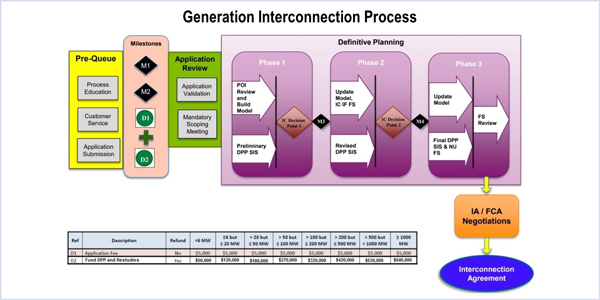By Amanda Durish Cook
Stakeholders are at odds with MISO over some aspects of the RTO’s new interconnection queue rules during a time when the queue is beset by “unprecedented” backlogs.
RTO staff said the sheer volume of prospective projects is creating an overwhelming definitive planning phase (DPP) study cycle this year.
“It’s the largest queue we’ve ever had — over 200 projects,” Patrick Brown, executive director of transmission asset management, said at a July 18 Interconnection Process Task Force (IPTF) meeting. MISO is reviewing project applications and will update the list of queue projects based on study findings by the end of July.
But multiple stakeholders have asked that queue implementation details be fleshed out in joint discussions involving either the Planning Subcommittee or Planning Advisory Committee. They contend that the RTO needs to more fully vet the policy and reliability implications of moving from one iteration of the queue process to the next.
Approved by FERC early this year (ER17-156), MISO’s new interconnection rules attempt to streamline an old process that was plagued by restudies and backlogs. (See FERC Accepts MISO’s 2nd Try on Queue Reform.) MISO Manager of Resource Interconnection Neil Shah said DPP studies coming out of the MISO West region are particularly heavy this year — “more than the current transmission system can accommodate” — and schedule delays are imminent. The RTO has so far this year received 85 requests representing nearly 12 GW of possible generation from that region alone.
“The most practical thing to do is to prepare for delays. It’s really unprecedented, and the complexity of the studies will increase. … We just want stakeholders to be aware of how much it’s going to take to study this amount of megawatts,” Shah said.
Staff argued against stakeholders that were looking to change an already agreed-upon DPP timeline.
“Let’s not beat this dead horse,” Brown said. “I think we’ve had those discussions before. It was really incumbent on the stakeholders to decide if they want to accept those risks, and they’ve agreed to those risks. Stakeholders preferred to get it started right away.” He added that discussion was laid to rest in IPTF meetings during the spring.
MISO will clear the February 2016 batch of projects from the first part of the DPP before submitting any of the August 2016 entrants, a process that stakeholders favored over merging the two groups together in order to initiate the studies earlier — even if the separated approach carries an increased risk of restudy.
Shah said stakeholders decided in spring to continue with the changeover schedule, which was initially filed with FERC.
“Based on the feedback that we’ve received so far, we’re going to continue the course on the original schedule,” he said.
Shah noted that the probability of delays is high, even without a current delay. MISO is putting more of its own resources toward the study effort, he said.
The RTO is adding an additional 14 engineers to the approximately 100-employee queue team to handle the influx of studies, according to Brown. Eight Siemens engineers are working on studies for the possible additions in the MISO West region alone.
“There’s much consternation and gnashing of teeth among my finance team right now,” Brown said. “We still think there are going to be delays no matter how many bodies we throw at it.”
Geronimo Energy’s Randy Porter applauded MISO for being able to complete its schedule of studies on time so far this year. “I’d like to copyright a term: ‘study-tsunami,’” he said.
Stakeholders asked if MISO will compare the high number of projects to anticipated load growth to see if the projects will realistically be built.
MISO “would take a step back and look at the comprehensive picture” in subsequent studies occurring further into the queue, Shah said.






